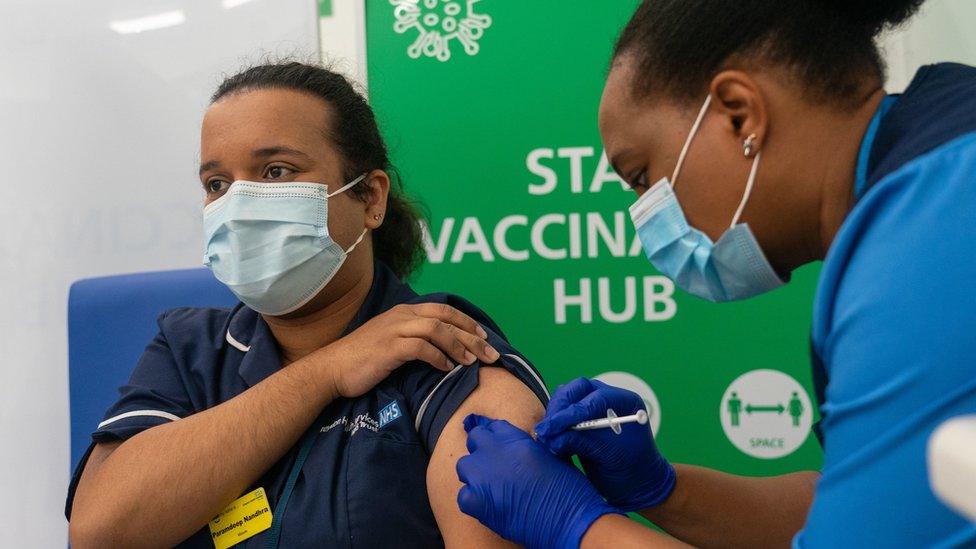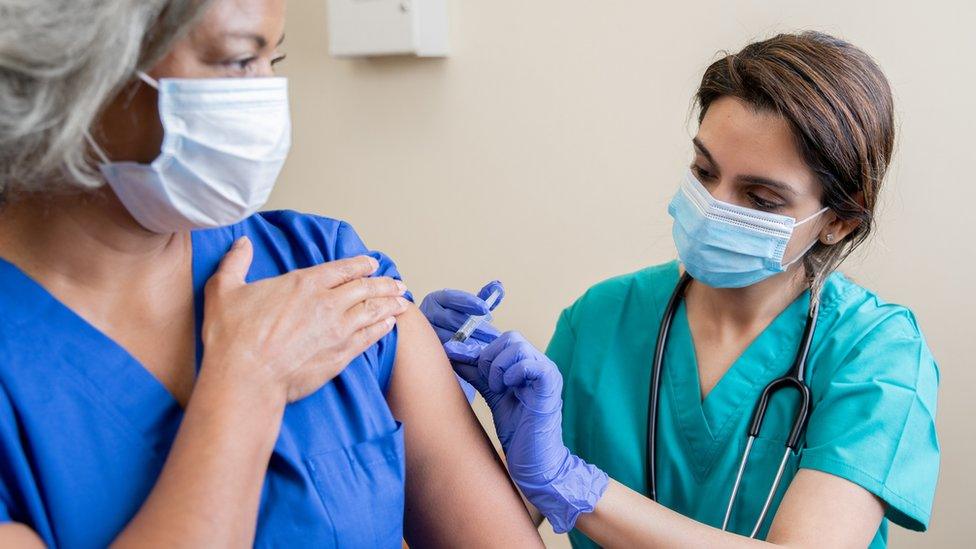Covid: Government may U-turn on compulsory NHS staff jabs
- Published

Ministers will meet later to decide whether or not to scrap mandatory Covid vaccinations for NHS staff in England.
Front-line NHS workers in England must be fully vaccinated by 1 April, meaning they need a first dose by Thursday.
If they are not jabbed by April, they will be redeployed or dismissed. Around 77,000 have had no jab at all.
Last week, Health Secretary Sajid Javid said the jabs requirement was being "kept under review" but that it was the "duty" of NHS staff to get vaccinated.
The policy was proposed when Delta was the dominant variant that was circulating and evidence showed being vaccinated significantly cut the risk of catching and spreading the virus.
Since then, a more contagious and slightly milder variant called Omicron has emerged. It has led to an increase in breakthrough infections among people who are vaccinated, although the jabs are still doing a great job at preventing severe cases.
Mr Javid told the Health and Social Care Select Committee on Tuesday that it was right to "reflect" on the policy now Omicron was dominant.
But it is understood no final decisions have been made.
The government has been under pressure from some within the health service to scrap the mandate, arguing that it would lead to a staffing crisis.
The Royal College of Midwives warned the policy could have a "catastrophic impact", external on maternity services, while the Royal College of GPs and Royal College of Nursing called for the deadline to be delayed.
But the Department of Health and Social Care has previously insisted the policy was "the right thing to do to protect patients".
The UK Health Security Agency says vaccines have proven to be effective against hospitalisation, mortality, infection and transmission.
"Several studies have provided evidence that vaccines are effective at preventing infection," a recent report said., external
"Uninfected individuals cannot transmit; therefore, the vaccines are also effective at preventing transmission."
Chief Secretary to the Treasury Simon Clarke told BBC Breakfast that while any change to policy would be a decision for the health secretary, he said "fundamental facts" had changed due to Omicron and so any decision would take that into account.


There are practical and ethical reasons why the mandatory vaccination policy may go.
On a practical level the NHS in England can ill-afford staff to be forced out - there are already nearly 100,000 vacancies.
And then on an ethical level - as some staff are pointing out - is it right to insist on vaccination when the benefits are not overwhelmingly clear cut with the rise of the Omicron variant?
Vaccination against hepatitis B is a condition of employment for some staff, but that is more than 90% effective against infection and immunity last for years.
By comparison immunity against Covid infection after two doses has largely gone after 20 weeks.
A booster can initially increase protection to around 70% but by 10 weeks that has started to wane significantly too.
It certainly helps to reduce spread, but is it enough to over-ride freedom to choose?
And if staffing levels drop further because of the mandate could the risks that pose outweigh the benefits the vaccine brings?

Protests against the policy have been held in cities across the country - and some NHS staff have said they are even considering moving to work in the UK nations where vaccination is not compulsory.
There are no plans in Scotland and Wales to make Covid jabs mandatory for NHS workers or care home staff, while there will be a public consultation on the issue in Northern Ireland.
Patricia Marquis, the Royal College of Nursing's director for England, said that while the college would urge all nursing staff to get vaccinated, it "makes no sense" to risk losing thousands of workers when there were already many vacancies.
She told BBC Breakfast that losing nurses and care staff "actually puts patients at more risk than not having nurses at all".
Nadra Ahmed, chairwoman of the National Care Association, said she was "saddened for all the people who may have lost their jobs needlessly", with mandatory vaccination already in place in that sector since November.
She said the policy had had a "devastating impact".
Government figures suggest 40,000 care staff had not been vaccinated by the deadline - but it is unclear how many of these lost their jobs because of medical exemptions and redeployment to roles away from the frontline.
"The people who we've lost, we hope they'll think about coming back and we will do everything we can to try and encourage them to come back, but they will have found other roles and they may be happier in their other roles now and not want to move again," she said.
While the mandatory vaccinations policy is due to come in to force for NHS workers on 1 April, Thursday is the final day on which workers could get their first dose with time to be fully vaccinated by that date due to the separation needed between first and second doses.
The latest figures show that almost 95% of NHS staff have had at least one Covid jab, leaving about 77,000 who have not.
That compares to around 91% of the general population in England who have had at least one jab, although that includes people aged 12 and over.
Speaking to MPs on the select committee last week, Mr Javid said not all of them were in patient-facing roles.
He said that while it was the "professional duty of every NHS worker to get vaccinated" it was "reasonable to assume" that not everyone would do so.
Mr Javid said the jabs requirement would be "kept under review". When pressed on whether that meant the government was considering scrapping it he added: "We're reflecting on it because we do have to accept that the virus has changed."
One of those who has said he is prepared to lose his job over mandatory vaccines is specialist paramedic Matt Taylor, 42, who is unvaccinated.
He works in primary care in Cumbria and said that he found the argument for the vaccine "a bit weak" as the vaccine has not eradicated Covid as some jabs have done with other diseases in the past.

Do you work for the NHS? Have you been vaccinated? Share your experiences by emailing haveyoursay@bbc.co.uk, external.
Please include a contact number if you are willing to speak to a BBC journalist. You can also get in touch in the following ways:
WhatsApp: +44 7756 165803
Tweet: @BBC_HaveYourSay, external
Please read our terms & conditions and privacy policy
If you are reading this page and can't see the form you will need to visit the mobile version of the BBC website to submit your question or comment or you can email us at HaveYourSay@bbc.co.uk, external. Please include your name, age and location with any submission.
Related topics
- Published22 January 2022

- Published29 January 2022
